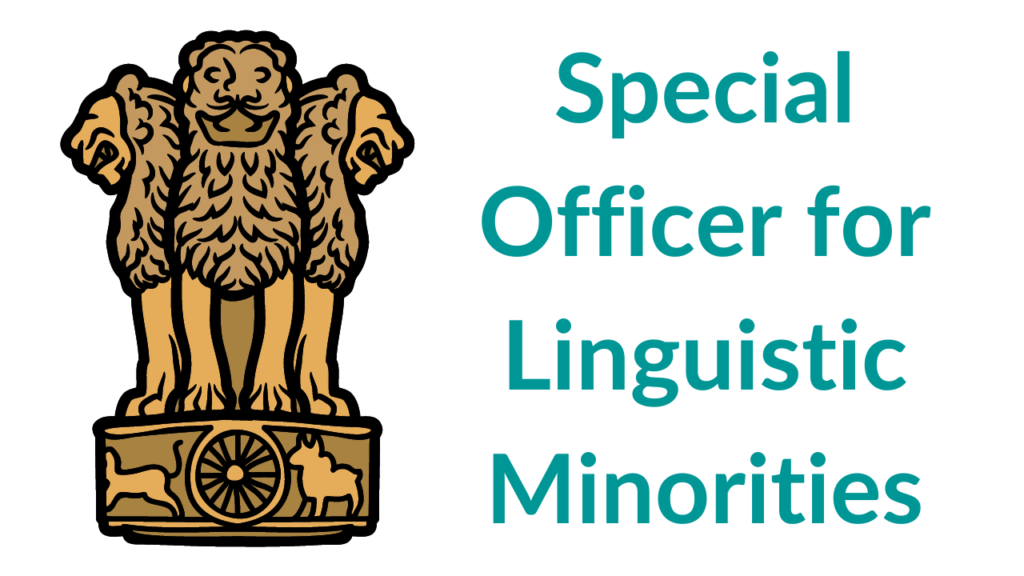In the diverse tapestry of India, language not only serves as a means of communication but also as a powerful emblem of identity and culture. With over 19,500 languages and dialects spoken across the nation, linguistic diversity is one of India’s most significant characteristics. However, amidst this rich linguistic landscape, linguistic minorities often face challenges in accessing education, employment, and governance due to linguistic barriers and marginalization.
Recognizing the importance of preserving linguistic diversity and ensuring equitable opportunities for all citizens, the Indian government has instituted various measures, one of which is the appointment of Special Officers for Linguistic Minorities.

In India, a linguistic minority refers to a group of people whose native language is different from that of the majority in their area. The Constitution ensures the protection of the interests of these linguistic minorities. In a diverse country like India, discrimination based on language is common. Each state has a significant population that speaks languages different from the majority. It’s the government’s duty to protect the rights of these minority language speakers while also promoting Hindi as the common language of the nation.
Articles 29 and 30 of the Indian Constitution aim to safeguard the rights of linguistic minority groups. Additionally, states can choose their regional language as the official language, Hindi-speaking states aren’t required to use English for communication, and the central government should provide discussions in both English and Hindi.
Objectives of the Special Officer for Linguistic Minorities
- Ensure linguistic minorities have fair chances for inclusive development and integration into the nation.
- Raise awareness among linguistic minorities about their rights for protection.
- Guarantee efficient enforcement of constitutional rights and protections.
- Provide equitable opportunities for linguistic minority groups.
- Educate linguistic minorities about the protections afforded to them.
- Ensure the effective application of safeguards for linguistic minorities.
- Manage grievances and representations concerning the safeguards for linguistic minorities.
Appointment of Special Officer for Linguistic Minorities
Originally, the Constitution of India didn’t address the need for a Special Officer for Linguistic Minorities. It was only after the States Reorganization Commission (1953-55) suggested it that changes were made.
Following this recommendation, the Seventh Constitutional Amendment Act of 1956 introduced Article 350-B. This article outlines the following points:
- A Special Officer for Linguistic Minorities should be appointed.
- The President of India is responsible for appointing this officer.
- The Special Officer’s duty is to investigate matters related to the protection of linguistic minorities as per the Constitution.
- The Special Officer must submit reports to the President at specified intervals, who will then present them to Parliament and share them with concerned state governments.
It’s important to note that the Constitution doesn’t specify the qualifications, tenure, salary, service conditions, or removal procedure for the Special Officer for Linguistic Minorities.
Roles and Responsibility
- The Special Officer for Linguistic Minorities, also known as the Commissioner for Linguistic Minorities, was established in 1957 as per Article 350-B of the Constitution.
- The Commissioner’s main office is located in New Delhi, with regional offices in Belgaum (Karnataka), Chennai (Tamil Nadu), Kolkata (West Bengal), and Prayagraj (Uttar Pradesh). Each regional office is headed by an Assistant Commissioner.
- The Commissioner’s headquarters is supported by a Deputy Commissioner and an Assistant Commissioner.
- The Commissioner maintains communication with State Governments and Union Territories through appointed nodal officers.
- At the central level, the Commissioner operates under the Ministry of Minority Affairs.
- Reports, including annual reports, are submitted by the Commissioner to the President through the Union Minority Affairs Minister.
Also read about office of National Commission for ST and National Commission for SC.